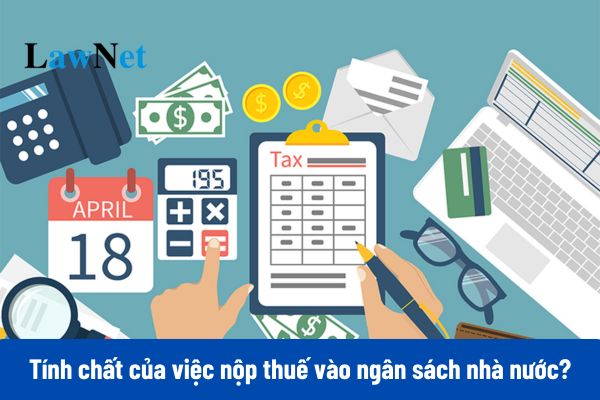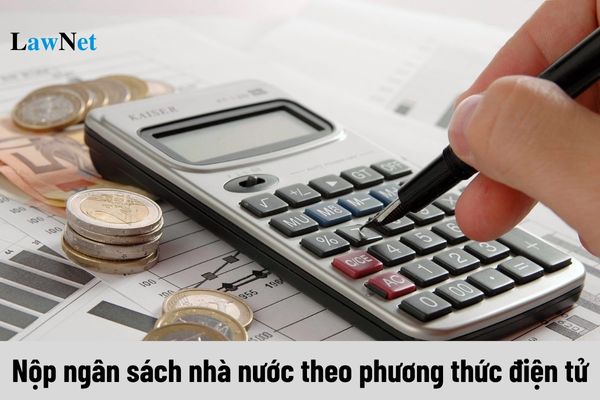What is the nature of tax as a contribution to the state budget in Vietnam? What are the responsibilities of tax authorities in managing Vietnam's state budget revenues?
What is the nature of tax as a contribution to the state budget in Vietnam?
Based on Clause 1, Article 3 of the Law on Tax Administration 2019, it is stipulated as follows:
Interpretation of Terms
In this Law, the terms below are understood as follows:
- Tax is a mandatory contribution to the state budget by organizations, households, business households, and individuals as stipulated by tax laws.
...
Thus, tax is a contribution to the state budget that has a mandatory nature.

What is the nature of tax as a contribution to the state budget in Vietnam? (Image from the Internet)
What does the Vietnam's state budget revenue include?
According to the provisions of Article 2 of Decree 163/2016/ND-CP, state budget revenue comprises the following items:
(1) Taxes contributed by organizations and individuals according to tax laws.
(2) Fees contributed by organizations and individuals as stipulated by law.
(3) Charges collected from services provided by state agencies; if operational costs are contracted, they are deductible.
(4) Charges collected from services provided by public service providers and state enterprises, after deducting amounts retained to cover operational costs as per legal regulations.
(5) Contributions to the state budget from state economic activities, including:
- Dividends distributed to the host country and other revenues from oil and gas exploration and exploitation activities;
- Recovered capital invested by the state in economic organizations;
- Dividends and profits distributed by joint-stock companies and limited liability companies with two or more members with state capital contribution;
- Remaining post-tax profits after establishing funds for state enterprises;
- Surplus revenues over expenditures of the State Bank of Vietnam;
- Recovery of principal and interest from state loans, except for on-lending from foreign loans to the Government of Vietnam.
(6) Contributions mobilized from agencies, organizations, and individuals as per legal regulations.
(7) Revenues from the sale of state assets, including revenues from transferring land use rights, conversion of land usage purposes managed by state agencies, units, and organizations.
(8) Land use fees; rents for land and water surfaces; usage fees for marine areas; rents and sales of state-owned housing.
(9) Revenues from assets under state ownership; licensing fees for mineral and water resource exploitation.
(10) Fines from administrative violations, penalties, and confiscations according to legal regulations.
(11) Voluntary contributions from organizations and individuals within and outside the country.
(12) Non-refundable aid from the Government of Vietnam to governments of other countries, organizations, and individuals outside the country to the state, Government of Vietnam, and local state agencies.
(13) Revenues from the financial reserve fund according to Article 11 of the State Budget Law 2015.
(14) Other revenues as provided by law.
Shall tax authorities organize Vietnam's state budget revenues?
According to Clause 1, Article 55 of the State Budget Law 2015, it is stipulated as follows:
Organization of State Budget Revenues
- Tax authorities are financial agencies, tax authorities, customs authorities, and other agencies assigned or authorized by competent state bodies to implement state budget revenue tasks.
- Only state budget revenue agencies are authorized to organize revenue collection.
...
Thus, according to the above provision, tax authorities are authorized to organize state budget revenue collection.
What are the responsibilities of tax authorities in managing Vietnam's state budget revenues?
Based on Clause 3, Article 5 of Circular 80/2021/TT-BTC, tax authorities responsible for managing state budget revenues must comply fully with the tax management regulations for the revenue allocated within their jurisdiction under the Law on Tax Administration 2019 and related implementation guidelines, specifically:
- Receiving tax declaration dossiers, extending the deadline to submit tax returns, and imposing penalties for tax-related legal violations concerning the filing of tax returns by taxpayers for the revenue assigned for management.
- Calculating late payment interest, adjusting late payment interest for taxpayers concerning the revenue assigned for management. For cases stipulated in points b, c, clause 2, Article 13 of Circular 80/2021/TT-BTC, late payment interest is calculated and adjusted at the tax authority managing directly.
- Guiding and urging taxpayers to pay into the state budget concerning the revenue assigned for management.
- Implementing measures to urge tax debt collection, coercively recover tax debts concerning the revenue assigned for management.
- Receiving and resolving applications for exemption from late payment interest, non-calculation of late payment interest, and tax payment deferment for the revenue assigned for management pursuant to Articles 22, 23, 24 of Circular 80/2021/TT-BTC.
- Receiving and handling petitions concerning taxpayers' overpaid amounts concerning the revenue assigned for management as stipulated in Article 25 of Circular 80/2021/TT-BTC, Article 26 of Circular 80/2021/TT-BTC.
- Receiving and processing applications for VAT refunds regarding investment projects assigned for management in accordance with Section 1, Chapter 5 of Circular 80/2021/TT-BTC.
- Receiving and addressing applications for overpaid tax returns for the revenue assigned for management as outlined in Section 2, Chapter 5 of Circular 80/2021/TT-BTC.
- Receiving and handling tax exemption and reduction requests from taxpayers for the revenue assigned for management in accordance with Chapter 6 of Circular 80/2021/TT-BTC.
- Conducting tax audits and inspections for taxpayers with assigned revenue management and penalizing lawful violations discovered during audits and inspections.
- In cases where the taxpayer falls within the scope of tax obligation allocation for the revenue stipulated in point d, clause 1, Article 13 of Circular 80/2021/TT-BTC, Article 15 of Circular 80/2021/TT-BTC, point d, clause 1, Article 17 of Circular 80/2021/TT-BTC, the tax authority managing state budget revenue executes additional tasks like the tax authority directly managing taxpayers with allocated revenue as stipulated in point k, clause 1, Article 5 of Circular 80/2021/TT-BTC.


- Vietnam: How to purchase from the 2025 Trade Union Tet Market online? How much is the labor union fee for members?
- What is the online "2025 Trade Union Tet Market" program in Vietnam? What types of taxes do online sellers have to pay?
- What is taxable income? How to distinguish taxable income and income subject to tax in Vietnam?
- Shall owners of household businesses with tax debt be subject to exit suspension in Vietnam from January 1, 2025?
- What are the changes in tax refund procedures in Vietnam from 2025?
- What tax enforcement measures will be applied for taxpayers that owe tax debt in Vietnam from January 1, 2025?
- What 08 financial, banking, securities trading, and commercial services shall be exempt from VAT in Vietnam from July 1, 2025?
- Are healthcare services and veterinary services exempt from VAT in Vietnam from July 1, 2025?
- What is the total income between 02 declarations in Vietnam? What does the tax declaration dossier for individuals paying tax under periodic declarations Include?
- What are 03 professional and comprehensive 2025 Tet holiday announcement templates for enterprises in Vietnam? Where are the places of tax payment for enterprises in Vietnam?

